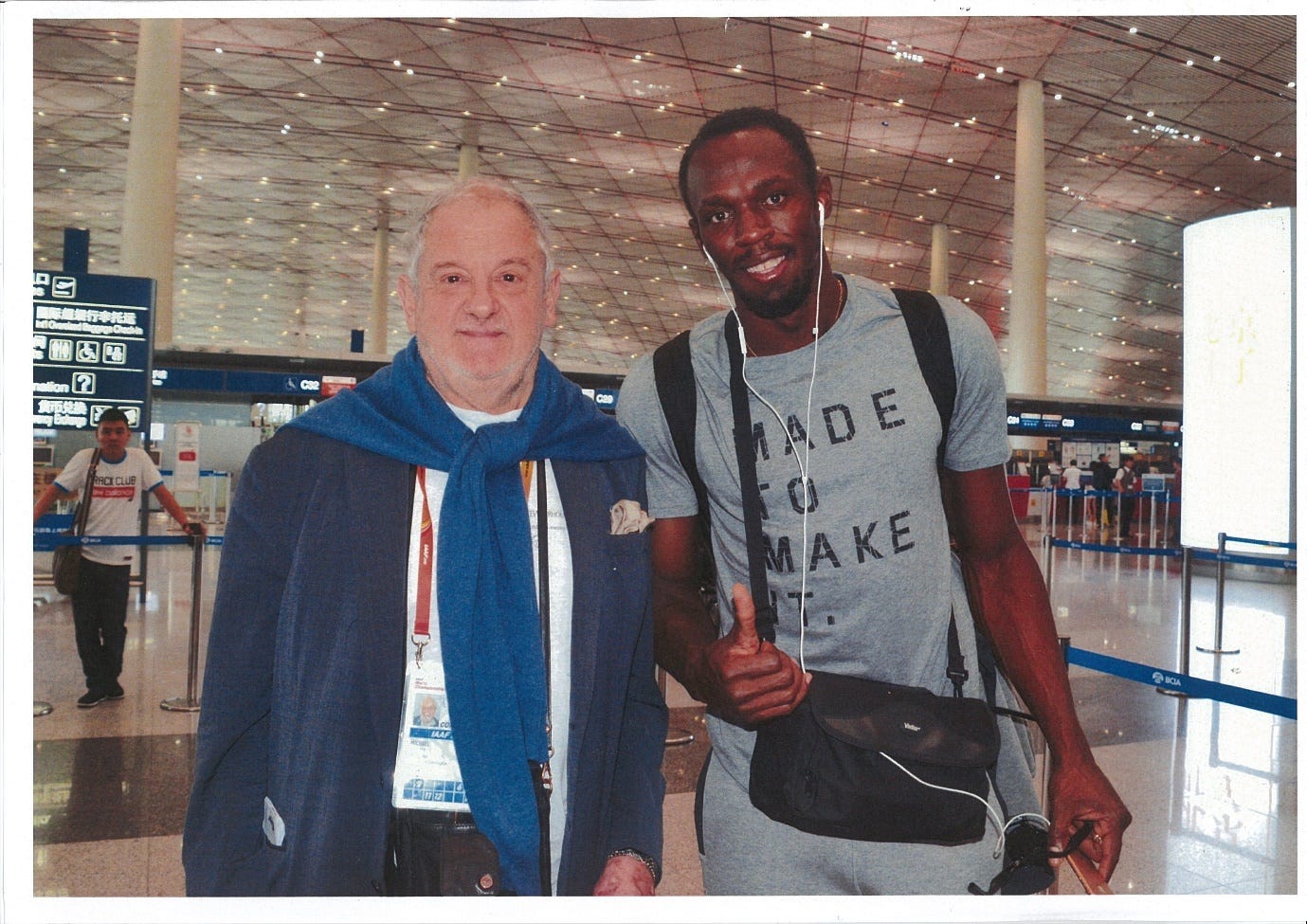6 mistakes that lie beyond the Euros; WSL as IPL; Scepticism v misogyny; MLBQC; Betting on athletics; The absence of anger; Gymshark jumps shark; Streaming consolidation; The parties in our heads
Overthinking the sports business, for money
Beyond the Euros: 6 mistakes that lie in wait for women’s football
The exam question is how to convert this moment in to a sustainable sporting league.
Yesterday I talked about this question with the brilliant Baroness Sue Campbell, chair of The FA.
It’s a really surprising and fascinating conversation - hear it next Tuesday, usual places.
Women’s football is in a fascinating place. The decisions that get made now will shape the sport for generations. I don’t envy those in charge.
Here are six mistakes I want them to avoid.
1: Mistaking Big Eventers for football fans
I’m fascinated by the women’s Euro 2022 crowds.
The size of them (64k at the opener) and their make-up.
I stood outside the Amex to pick up my daughter who was working hospitality at the England Norway game on Monday.
Families, kids, girls in England shirts, young blokes waving flags.
I was struck by the absence of anger, the undercurrent that’s always there at a men’s international or club game, and which we sometimes excuse as tribal passion.
It was lovely, and reminded me of London 2012.
And that’s the problem. You could easily be lulled in to believing that those Big Eventers will show up in December for that mid-league tussle.
Mistake 2: Believing the major event hype
Major sports events have disappointment built in from the start.
To win the right to host, the bid team over promises.
Varied constituencies are encouraged to project on to the event their own hopes and dreams: the event becomes a panacea to my own particular unhappiness.
The party ends, and the problems remain.
Or more accurately, the legacy is there, but it’s not the clean linear process assumed going in. It’s unevenly spread.
In total, we’re better off after the Women’s Euros than we were before.
Individually, it might not feel like that.
Mistake 3: Dismissing criticism as misogyny.
There was a moment as Monday’s game approached half time.
England were 6-0 up.
My Twitter feed was bracing itself for the obvious onslaught from the idiots who just want to dump shit on women’s football.
The word started to go round: Ignore the haters. This is a great performance. Etc.
I understand the impulse. It comes from a well meaning place.
Women’s football needs this moment. Don’t spoil the party by asking questions.
The problem is, in that environment, the response to any scepticism is along the lines of: ‘Fuck off you gammon boomer’.
But. It sets us up for mistake number four. And it’s a big one.
Mistake 4: Sleep walk in to copying professional rugby
Competitive balance is the single biggest problem facing women’s football.
Because it’s the hardest thing to fix.
And, it’s harder to fix at international level than it is at club level.
The bigger European nations, the US and China will win more because they have massive advantages - money, incentive, infrastructure, early mover.
They are building a moat, in terms of talent development and professionalisation.
Moats are great for tech investors, but tend to make for crap sport.
The alternative is to sleep walk in to the challenges faced by World Rugby and the ICC: a small number of competitive nations separated from the rest, a gulf that will probably never be breached despite well meaning attempts to grow the game.
So, we get to the question of engineering.
As in, how can competitive balance be embedded into the structure of the sport?
Then you look at two of the best run sports leagues in the world, the NFL and the IPL.
They are set up to succeed. The engineering has been done at inception.
If you were creating the IPL for Women’s Football - IPLWF - where would you do it?
Two choices: US or England.
So, the WSL as global super league: concentration of talent, control of costs, long term investment runway for team owners.
There’s a key difference between WSL and IPL: Open v closed.
This is as much a philosophical divide and a technical one.
And it leads to mistake number 5.
Mistake 5: Trying to do it all
The FA’s role is interesting here.
There are two jobs to be done.
Build an entertainment product - the WSL.
Grow girls participation in football.
Is The FA the right organisation to do both jobs?
Again, we’re back to the philosophical divide of open v closed.
The FA must be open. That’s its remit.
So, we’re talking pathways, from the bottom of the pyramid to the top.
But is this the right approach to create the best entertainment product in women’s football, to take advantage of this current moment, when it has the world’s attention?
Mistake 6: Ignoring how money works
It’s significant that The FA has rejected private equity investment as an option to grow the WSL.
This leaves an organic growth strategy.
The current runway - outlined by Mark Bullingham, The FA CEO on UP187 - has 2032 as the break even moment, when the WSL becomes financially sustainable.
This is based on estimates of three media rights cycles.
The p/e conversation was about bringing that 2032 date closer to somewhere in the mid 2020s.
I’m no p/e fanboy, but if I was working at CVC, Silver Lake or some other sports-interested investment house, I’d be wondering if the WSL is now vulnerable to attack from a best v best international closed league of franchises (10 Angel Cities), backed by p/e or Saudi sportswashing cash.
See other UP threads:
See also: Ed Warner flagged a similar issue in rugby.
Days before the start of the Euros, the RFU published a ten year strategy for Premier 15s, the pinnacle league for women’s rugby in England, now five years old. Refreshingly, the question of finance is addressed upfront, a clear recognition that elite women’s team sports need hard cash to grow roots and then flourish. The RFU’s model shows a £222m cost to run Premier 15s for a decade, offset by £174m of income. The governing body is pledging £48m to make up the difference.
WhatsUP on innovation in athletics
Snippets from the Unofficial Partner invite-only sports business backchannel.
@Drew Barrand: Interesting column - athlete promoting betting as a solution to re-engage fans in athletics.
Eilish McColgan column: Is athletics dying? Or does it just need reviving?
@Ricardo Fort: Good article. Thanks for sharing. The misconception among many Federations and athletes is that they fail for lack of distribution. “Broadcast my event and it will thrive” when the reality (for me) is that they fail because their product is bad (not the athleticism, but the storytelling). Until they start telling better stories, fans will continue to ignore most of the sports and events.
@Patrick Nally: World Athletics have lacked creative and event development by offloading their commercial rights on a fixed guarantee to ISL and then Dentsu for the past 30 years. No incentive to improve the product and now the sport is facing the consequences.
Consolidate, Consolidate, Consolidate
There are too many sports streamers and OTT suppliers. Discuss.
Summary:
DAZN looking at buying Eleven.
Eleven owns MyCujoo.
That forms part of the content back bone of FIFA+
Gymshark jumps shark
Gymshark are famous as the direct to consumer heroes of the last five years.
They are famous for building a billion quid brand without recourse to advertising.
Then suddenly, this (thanks to Andy for flagging).


My bet is this idea came from an ad agency brainstorm.
It’s based on an anecdote - Men open up to their barbers more than their doctor - that’s been repurposed as ‘insight’.
There followed a process that included these words and terms: ladder up and down, experiential, social impact, brand purpose, The Why, amplify via social.
Two reasons I don’t like it.
First, it’s a deeply silly PR stunt approach to a very serious issue.
Secondly, if you really believed the research upon which the idea is based, you’d do it the other way around. It's easier/cheaper/quicker to train therapists and doctors to be barbers, rather than turn barbers in to qualified mental health professionals.
But the doctor would doubtless tell you to fuck off.
Irrelevant detour: This has echoes of a conversation I once had with - NAME DROP IMMINENT - Richie Benaud.
My job was to filter emails from Channel 4 cricket viewers so they could form the basis of lunch time conversation between Richie and Mark Nicholas, the show’s host.
The problem was we didn’t get any emails.
So, I made them up.
One of them, that got on air, was this: is it easier to train Ian Bell to be a wicketkeeper or teach Chris Read to bat at six?
Richie liked this.
Or at least I like to think he liked it. It was very difficult to tell.
MLBQC
Michael Beloff QC (above left…) is described by Chambers legal directory as ‘the godfather of sports law’ and ‘the person who more or less invented sports law’.
But what is sports law, what’s the difference between a good and bad sports lawyer, does the endless doping and matchfixing make you cynical and should runners be allowed to wear super shoes?
It was a right laugh btw.
And I recommend his new book.
Hear UP256 with Michael Beloff here.
UP thread: Lawyers and the enablement supply chain
Research of the week
The Parties in Our Heads - Misperceptions about Party Composition and Their Consequences
Democrats believe 44% of Republicans make >$250k (it’s 2%) & >40% are Seniors (<20%). Republicans believe 38% of Dems are LGB (it’s 6%) & 44% are Black (24%). The more political media you take in, the more biased your estimates.
Hear also: UP78 Matt Locke on imagined audiences.
See also: Esports journalism is dying a death, gamers prefer to get their ‘news’ from influencers.
See also: Tories are charging £125 for media accreditation to their party conference. (To be clear, you have to pay that to get in, not get out).
The Job: Senior Research and Insights Manager, Redtorch
The Blurb: Redtorch is seeking a sport-loving, number-crunching Senior Research and Insights Manager to lead its Research and Performance Lab and work with some of the world’s biggest sports organisations and brands. Responsible for all audience and market research projects, the Senior Research and Insights Manager is a leadership role that operates at the heart of, and supports strategic work across, the entire business.
The Link: Click here for more information and to apply.








